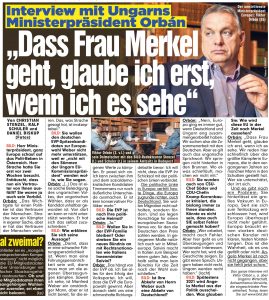Change language:
Orbán vows to strive for EPP success – interview / Bild

Prime Minister Viktor Orbán, in an interview to Germany’s Bild on Friday, said he would strive for the success of the European People’s Party. “I want the EPP to win the European Parliament election, but afterwards there will be a debate on the direction it takes,” he told the paper.
Orbán said he still considered the EPP his “political home”.
He added that whether Fidesz stayed in the EPP or joined a new alliance depended on the EPP. “[There’s] a painful debate ahead of us,” he said.
The prime minister cautioned the EPP against joining forces with the left wing, which he said planned “European socialism”, the price of which would be paid by Germans and central Europeans.

He said that in Italy, Matteo Salvini, the interior minister who leads the League party, “is doing a good job”. After the election, all options for an alliance with him should be on the table, he added.
He blamed the Scandinavian and Benelux members of the EPP for strife in the grouping and the initiative to exclude Fidesz from the EPP, saying its leaders were too weak to rebuff it.
Orbán said Manfred Weber, the EPP’s lead candidate for the post of European Commission president, had rejected the votes of Hungarians and therefore did not deserve to receive them. Weber, he added, was a weak leader who “is not ready to fight for his own values”. The Fidesz leader preferred not to reveal for the time being who he would support instead.
Commenting on the appearance of Weber on billboards promoting secure external borders, Orbán said Europe would be wise to support Hungarian border policy. He noted that Hungary had not received any European Union funding for its fence on the southern border. Hungary, he added, will not allow Frontex to police the Hungarian border, adding that Frontex was needed where the authorities were unable to protect their borders.
Commenting on the political turmoil in Austria, Orbán said: “We’d rather not interfere in Austrian domestic politics.”
As regards the case of Heinz-Christian Strache, who last weekend resigned his post of Austria’s vice-chancellor, Orbán said the most important thing for a politician was having the trust of the people. But Strache, he said, had made “unacceptable” remarks, with which he lost that trust.
Meanwhile, he said Hungary’s economy was growing by more than an annual 5 percent, had a competitive tax system and was approaching full employment but further investment — from Germany too — was needed.
On the topic of press freedom, Orbán said that he was strongly criticised from all sides in the media. “It would be good if the Hungarian press put wind in my sails but now I’m ploughing into headwinds.”
Turning to international affairs, Orbán said that whenever there was a conflict between Russia and the West, Hungary always suffered. “So a balance must be found.” Strength must be shown when it comes to defence and security while economic cooperation should be the focus of negotiations, he added.
Noting his recent talks with Donald Trump at the White House, Orbán said the US president’s administration faced “injustice”, since none of their successes were recognised. Whereas their scale is different, Hungary and the US share similar traits, he said. The US economy is developing better than ever, there is a deep consensus on immigration, and both act in ways to ensure that Israel is treated fairly, he said.
Commenting on George Soros, the prime minister said his dispute with the US billionaire had nothing to do with anti-Semitism but rather with “casino capitalism, NGOs with opaque funding and political interests, and speculators”. In Hungary, he added, there is zero tolerance of anti-Semitism.
“The Jewish community [in Hungary] is probably the safest in Europe,” Orbán said.
Regarding German Chancellor Angela Merkel’s future departure: Orbán said: “I’ll only believe if I see it.” He said Merkel would be leaving a vacuum in Europe, adding that this was a “problem”. He said that since Merkel had made a partial withdrawal, Europe was bereft of any leadership. “Europe needs a strong German Chancellor with clear, bold ideas,” Orbán said, adding that Merkel had not left yet but was already missed.
The prime minister insisted that the German-French axis was no longer. “France, Germany and the Visegrad states: this is what Europe’s new geometry looks like,” Orban said. The Visegrad states have a lasting alliance politically, emotionally and economically, he said. One day, Germany will recognise that it also belongs to this central European grouping, Orbán declared. “This will change politics in Europe”, he added.
Source: MTI







